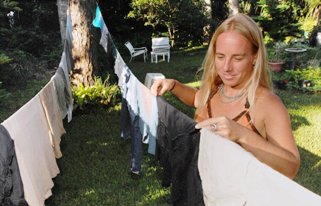|
Article Courtesy of The Florida Times Union By Liz Van Hooser Published September 8, 2009 When Jenifer Van Dyke's daughter was born 51/2 years ago, Van Dyke decided to give her dryer a break and start hanging her clothes outside. She was using cloth diapers and figured the sunshine — and the mild bleaching from the sun's rays — would be good for the diapers and save some energy to boot. Van Dyke found an unexpected benefit from hanging her little girl's clothes in the fresh air: She liked it.
restrictions, covenants, or similar binding agreements ... shall prohibit clotheslines." Neighborhood associations that forbid clothes drying outside aren't following the law, but that doesn't stop them from doing it, said Jan Bergemann, president of the Cyber Citizens for Justice, a property owners' advocacy group. Although a person could sue — and state law says the losing party must pay legal costs — it's a law that rarely gets tested. "Most people just don't want to go to the trouble for a clothesline," he said. Florida's Right to Dry law has been on the books for decades, making it one of the nation's first such laws, said Alexander Lee, founder of Project Laundry List, a New Hampshire-based group that advocates air drying. A similar law was passed in Hawaii this year. Colorado, Utah, Maine and Vermont also protect clothesline use. It seems like a little thing, Lee admits, but if Americans could part from their dryer dependence, the energy savings would add up in a hurry. According to the Department of Energy, 5.8 percent of electric use is devoted to running dryers. But that doesn't even account for the energy used to power gas dryers or dryers used for "commercial purposes," such as at hospitals and prisons, Lee said. Dryer use became widespread in America after World War II. And today about eight out of 10 households have one. Gretchen Ferrell, founder of the Beaches Local Food Network, has a dryer at home for just-in-case situations, but she almost always hangs her clothes in the Florida sun. She recently sent an e-mail to food network members about Florida's "Right to Dry" law. She said a friend, who would not talk to the Times-Union for this story, was warring with her neighborhood association about a backyard clothesline. At this point, her friend is trying to work out the dispute quietly and didn't want to rock the boat too much. For Ferrell, using a clothesline, is a no-brainer. It produces clothes that smell good, it saves money and it saves electricity. "I just do it because it makes sense," she said. |
